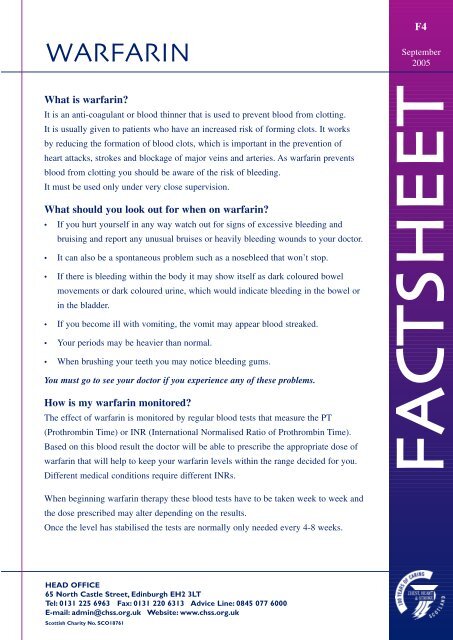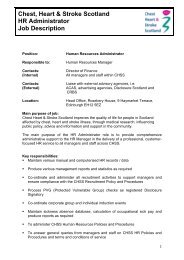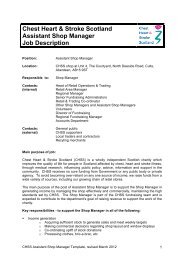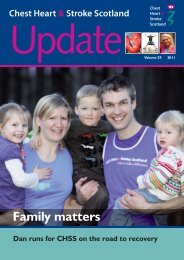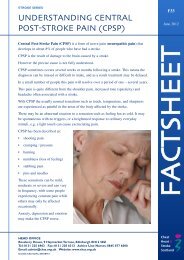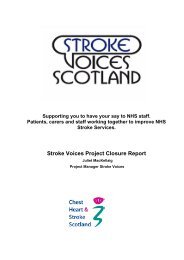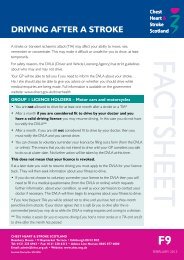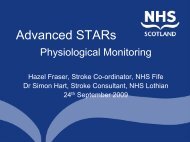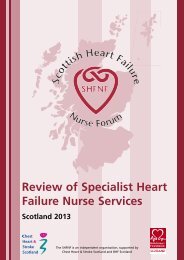fact sheet-warfarin - Chest Heart & Stroke Scotland
fact sheet-warfarin - Chest Heart & Stroke Scotland
fact sheet-warfarin - Chest Heart & Stroke Scotland
Create successful ePaper yourself
Turn your PDF publications into a flip-book with our unique Google optimized e-Paper software.
WARFARIN<br />
F4<br />
September<br />
2005<br />
What is <strong>warfarin</strong>?<br />
It is an anti-coagulant or blood thinner that is used to prevent blood from clotting.<br />
It is usually given to patients who have an increased risk of forming clots. It works<br />
by reducing the formation of blood clots, which is important in the prevention of<br />
heart attacks, strokes and blockage of major veins and arteries. As <strong>warfarin</strong> prevents<br />
blood from clotting you should be aware of the risk of bleeding.<br />
It must be used only under very close supervision.<br />
What should you look out for when on <strong>warfarin</strong>?<br />
• If you hurt yourself in any way watch out for signs of excessive bleeding and<br />
bruising and report any unusual bruises or heavily bleeding wounds to your doctor.<br />
• It can also be a spontaneous problem such as a nosebleed that won’t stop.<br />
• If there is bleeding within the body it may show itself as dark coloured bowel<br />
movements or dark coloured urine, which would indicate bleeding in the bowel or<br />
in the bladder.<br />
• If you become ill with vomiting, the vomit may appear blood streaked.<br />
• Your periods may be heavier than normal.<br />
• When brushing your teeth you may notice bleeding gums.<br />
You must go to see your doctor if you experience any of these problems.<br />
How is my <strong>warfarin</strong> monitored?<br />
The effect of <strong>warfarin</strong> is monitored by regular blood tests that measure the PT<br />
(Prothrombin Time) or INR (International Normalised Ratio of Prothrombin Time).<br />
Based on this blood result the doctor will be able to prescribe the appropriate dose of<br />
<strong>warfarin</strong> that will help to keep your <strong>warfarin</strong> levels within the range decided for you.<br />
Different medical conditions require different INRs.<br />
FACTSHEET<br />
When beginning <strong>warfarin</strong> therapy these blood tests have to be taken week to week and<br />
the dose prescribed may alter depending on the results.<br />
Once the level has stabilised the tests are normally only needed every 4-8 weeks.<br />
HEAD OFFICE<br />
65 North Castle Street, Edinburgh EH2 3LT<br />
Tel: 0131 225 6963 Fax: 0131 220 6313 Advice Line: 0845 077 6000<br />
E-mail: admin@chss.org.uk Website: www.chss.org.uk<br />
Scottish Charity No. SCO18761
What other <strong>fact</strong>ors can affect the action of <strong>warfarin</strong>?<br />
Medicines<br />
Many drugs can interfere with the action of <strong>warfarin</strong>. Some should never be taken<br />
with <strong>warfarin</strong> and others can interfere with the action. This is why you must always<br />
check with your doctor or pharmacist before taking even ‘simple’ things like vitamin<br />
supplements and over the counter remedies.<br />
Aspirin, non-steroidal anti-inflammatory drugs such as ibuprofen, ketoprofen,<br />
naproxen and others should be avoided as these increase the risk of bleeding.<br />
Alcohol<br />
Alcohol will increase your INR so it should be limited to small amounts on a regular<br />
basis rather than binge drinking.<br />
Diet<br />
Try and eat a normal balanced diet and avoid sudden changes especially just before<br />
having blood taken.<br />
Remember that high vitamin K foods will lower your INR readings such as liver and<br />
green leafy vegetables (broccoli, cabbage, watercress, spinach, brussel sprouts). You<br />
do not need to avoid these foods as they are good for you but you should be aware<br />
of keeping your intake consistent from day to day.<br />
It is also recommended that you avoid cranberry juice when taking <strong>warfarin</strong> as it<br />
increases the anticoagulant effect of <strong>warfarin</strong> and could trigger bleeding.<br />
Taking Warfarin<br />
• You must take Warfarin exactly as directed by your doctor. If you do not understand<br />
these directions ask your pharmacist, nurse or doctor to explain them to you.<br />
• You must always tell anyone treating you such as a doctor, dentist or pharmacist<br />
that you are taking Warfarin.<br />
FACTSHEET<br />
• Always carry your anti-coagulant card with you.<br />
• It is important to take your <strong>warfarin</strong> at the same time every day, your blood tests<br />
will be more consistent because of this.
• Never adjust the dose yourself.<br />
• Never take an extra dose to catch up if you miss a dose.<br />
• If you miss a dose take it as soon as you remember up to 12 hours late. If it is more<br />
than 12 hours late you should not take it and take your next dose at your normal time.<br />
• Check with your doctor if you are unable to eat for several days or if you have<br />
continuing stomach upset, diarrhoea or fever.<br />
• Never stop taking <strong>warfarin</strong> without medical supervision.<br />
Further information:<br />
AntiCoagulant Europe<br />
PO Box 405<br />
Bromley<br />
Kent<br />
BR2 9WP<br />
Tel: 0208 289 6875<br />
Fax: 0208 464 2417<br />
Email: anticoagulation@ntlworld.com<br />
Website: www.anticoagulationeurope.org<br />
FACTSHEET<br />
FACTSHEET<br />
FACTSHEET<br />
If you would like to speak to one of our nurses in confidence,<br />
please call the <strong>Chest</strong>, <strong>Heart</strong> and <strong>Stroke</strong> <strong>Scotland</strong> Advice Line<br />
Monday - Friday 9.30am - 12.30 and 1.30pm - 4.00pm<br />
0845 077 6000


